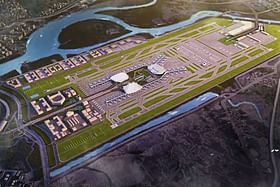The work on the first phase development of Navi Mumbai International Airport (NMIA) will be completed by December 2024, reports Economic Times.
“With just one runway (main) available at Mumbai International Airport, the scope of expansion at the airport remains limited. The target for Navi Mumbai International Airport is December 2024 and we are on course to achieve it,” said Arun Bansal, CEO, Adani Airport Holdings Limited in an interview with ET on the sidelines of an ASSOCHAM’s conference.
NMIA which will be the second airport in Mumbai Metropolitan Region (MMR) will address the capacity constraints at Chhatrapati Shivaji Maharaj International Airport (CSMIA).
Mumbai – the financial capital of India, and the capital city of the state of Maharashtra forms the largest urban center within the Mumbai Metropolitan Region.
With a set of two cross runways, the existing Chhatrapati Shivaji Maharaj International Airport was handling more than its peak capacity of 4.8 crore passengers per annum before Covid struck in March 2020.
The NMIA project will be developed in phases with a capacity to handle 60 million passengers per annum (MPPA) and 1.5 million tonnes cargo per annum.
In the initial phase, NMIA will implement passenger capacity of 20 MPPA and 8,00000 tonnes per annum of cargo handling.
The project is being implemented by Navi Mumbai International Airport Limited (NMIAL) which is a special purpose vehicle (SPV) with equity participation of Adani Airport Holdings Limited (AAHL), a wholly-owned subsidiary of Adani Enterprises Limited and CIDCO (City and Industrial Development Corporation) in 74:26 ratio.
In March 2022, Adani Enterprises achieved financial closure for the development of the greenfield project, with the public sector lender, State Bank of India (SBI), underwriting the entire debt requirement of Rs 12,770 crore for the project.
Adani Group is also looking to make Navi Mumbai International Airport as the most digitized airport in the world.
“We are creating a roadmap to make every single airport 4.0 with automation, AI (artificial intelligence), machine learning, metaverse,” Bansal said.
Last year, the Adani Group successfully acquired 5G telecommunication spectrum and will utilize the same for enterprise applications across its businesses.


